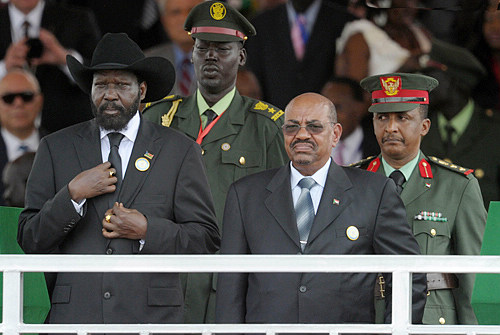|
 |
|
THE BIRTH OF A NATION: South Sudan's President Salva Kiir Mayardit (front left) stands next to Sudan's President Omar al-Bashir during the independence ceremony of the Republic of South Sudan in Juba on July 9 (XINHUA/AFP) |

The Republic of South Sudan declared its independence at a ceremony in Juba, the world's newest state capital, on July 9.
As the envoy of Chinese President Hu Jintao, China's Minister of Housing and Urban-Rural Development Jiang Weixin attended the independence ceremony. On the same day, President Hu sent a message of congratulations to Salva Kiir Mayardit, President of Africa's youngest country.
Independence
South Sudan was formerly part of the Republic of Sudan. However, under the Comprehensive Peace Agreement signed in 2005, the Sudanese Government agreed to accept the independence of the country's restive south, as long as separation was endorsed by the majority of the south's population at a referendum.
At the referendum held on January 9, more than 98 percent of the south's citizens chose to be independent and after half a year of preparation, the Republic of South Sudan became the 54th state in Africa. Coming as it does after years of civil war, South Sudan's independence has sparked jubilation among the new nation's 8 million citizens.
It is hoped that independence will put an end to the south's long-standing enmity with the north and help establish lasting peace in the region.
South Sudan's independence is the result of a number of factors. First and foremost are the long-term problems left by colonialism. Britain started its expansion into Sudan in the 1870s. By 1899, Sudan had become a condominium of Britain and Egypt. Britain adopted a divide-and-rule policy toward the north and the south of Sudan. For example, British colonial authorities passed a law in 1924 forbidding Sudanese who lived north of the 10th parallel north from travelling to the south and those who lived south of that line from going to the north. This policy strengthened existing differences between these two parts of the country and sowed the seeds of future conflicts.
While British colonial policies laid the groundwork for eventual separation, a number of shortsighted policies adopted by Sudan's Government made north-south separation inevitable. The Khartoum-based government has long been controlled by Arabic-speaking Muslims who have not paid sufficient attention to the development of the Christian south. The north even tried to enforce Islamic law across the country—a move that deepened divisions between the two sides.
A civil war broke out in 1955, one year before Sudan's independence from colonial rule. The south's black African population had been angered by the pro-Islamic agenda fostered by northern leaders. In March 1972, the Khartoum government signed an agreement with the south allowing autonomy for the south, bringing the civil war to an end.
In the early 1980s, however, President Gaafar Nimeiry again tried to impose nationwide Islamic law. His attempts elicited strong protests from the south. In May 1983, southern military officials and soldiers, led by John Garang, staged a coup and founded the Sudan People's Liberation Army. They started an armed struggle against the northern government, and the second civil war broke out. The war left 2 million people dead, and 5 million others homeless.
After the Comprehensive Peace Agreement was signed to end the second civil war, Sudan's President Omar al-Bashir made an effort to make concessions to the south. Hoping that the south would choose to remain within a united Sudan, Bashir offered the region greater autonomy and a fairer distribution of oil revenues. But by the time of Bashir's concessions, resentment in the south was too deep to allow the survival of a united Sudan.
Despite a clear historical and political dynamic, the south's independence could still not have been achieved without a crucial third factor: Western interference. Western countries, led by the United States, promoted the independence of the south to weaken the government in Khartoum.
To achieve their ends, they used a carrot-and-stick approach. On the one hand, the International Criminal Court issued an arrest warrant to Bashir on the grounds that he was suspected of committing war crimes in Darfur. On the other hand, the United States claimed it would consider removing Sudan from its blacklist of "state sponsors of terrorism" if the Bashir government conformed to U.S. interests.
| 